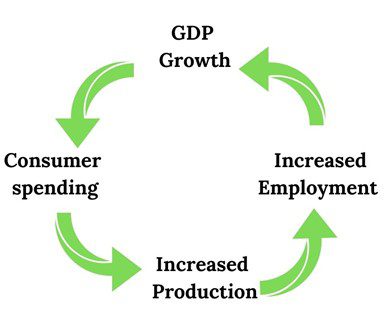Economic Issues focuses on how the changing economic conditions can impact business. You may be asked questions like these:
| Past Paper Question Examples Paper 1 (a) Identify two stages of the business cycle. [2] Paper 2 (b) Explain how the following two changes are likely to affect ABC business – lower income tax in country X – increase in interest rates in country X Which change is likely to have the most effect on profit? Justify your answer. [12] |
6.1.1 Business Cycle
Impact on businesses of changes in employment levels, inflation and gross domestic product (GDP)
Before we go further we have a few essential definitions to learn.
The economy is everything which is produced and consumed within a country. Every action by businesses or individuals which involves a transaction contributes to the economy.
Gross Domestic Product (GDP) is a way of measuring the size of the economy or economic activity. It’s calculated by adding up the value of all the goods and services produced in one country in one year.
The United States and China are two giants of GDP, they contribute over 40% of the whole world’s GDP.

Increased GDP leads to a positive spiral of greater consumer spending, increased production, and higher employment. Higher consumer spending means increased opportunities for higher sales and profits for businesses. However, a negative spiral of decreasing GDP, resulting in lower consumer spending, production and employment means tougher economic conditions for businesses.
Main stages of the business cycle
The business cycle tracks the size of the economy as it increases and decreases in size and goes through four phases: growth, boom, decline and slump.
| ⭐⭐⭐Top Tip ⭐⭐⭐ Learn each phase of the business cycle and its impact on business |
We can plot each phase on a graph to see what the business cycle looks like.
In the growth phase, GDP is increasing so it’s a good time for businesses to expand. Unemployment decreases, so consumers have more money to spend.
In the boom phase there are high levels of consumption and lots of money flowing in the economy but also high costs, as prices rise and labour becomes more expensive.
Inflation is more likely in the boom phase. Inflation is when prices and salaries rise quickly so the value of money (what you can buy) decreases.
Recession is when the economy is getting smaller. It’s a tough time for businesses with less demand from consumers and higher unemployment.
Finally a slump is when there is a long period of little movement in the economy. There is low demand from consumers so it’s not a good time for business. There are also high unemployment rates.
So how does the government try to control the business cycle to make sure economies continually grow and avoid recession and slumps? And how does this affect business?
6.1.2 How Government Control Over the Economy Affects Business Activity
Government economic objectives
We have seen how the business cycle has two positive phases but also two phases that are challenging for business and governments.
Therefore, governments aim to change the highs and lows of the “boom and bust” in the business cycle. Government’s economic objective is to create continual sustainable growth, leading to higher GDP and high employment. Governments also must keep inflation under control.
They have 3 tools that they can use to try and control the economy, each with a different impact on consumers and business.
Impact of changes in taxes, government spending and interest rates.
- Taxes: increasing taxes will mean consumers have less money to spend, so businesses will find it more difficult to make sales. If the government decreases taxes, consumers will have more money to spend and business should benefit.
- Interest Rates: if interest rates increase, consumers are more likely to save and less likely to spend. It also means businesses will have higher repayments on their debts. Businesses may choose to postpone a large capital investment or choose another source of finance, for example, equity finance rather than debt finance. If interest rates are low the opposite is the case and businesses are more likely to invest in capital projects.
- Government Spending can reach up to 50% in countries like France and Germany, the worldwide average is 15%. Therefore, government spending can have a huge impact on business. A government may choose to invest in capital projects like infrastructure, schools, hospitals, roads or a 5G network. This could be great news if your business is in building or construction and secures a lucrative government contract.
| In 2020 India announced $1400 billion government spending on infrastructure projects |
Governments can also spend on welfare payments, to unemployed people or parents with young children. If governments give more money to their citizens it will mean higher consumer spending and business will benefit from higher sales
The reverse is true if the government cuts spending. It will generally mean tougher conditions for consumers and businesses.
How businesses might respond to these changes
Usually when the economy is in a recession or slump, luxury products like expensive cars, fashion and holidays experience low sales.
Companies can adapt by offering lower cost alternatives, so their customers continue to spend. This may mean lower profit margins, but in times of recession or reduced consumer spending, business objectives will change to survival and retaining market share.
Changing economic conditions can also present an opportunity for business.
During the 2009 economic crash Netflix increased its market share, by marketing itself as a low cost alternative to expensive cable TV packages.
| ⭐⭐⭐Top Tip ⭐⭐⭐ When completing questions on external influences remember to on external influences impact on the business in the question. |

